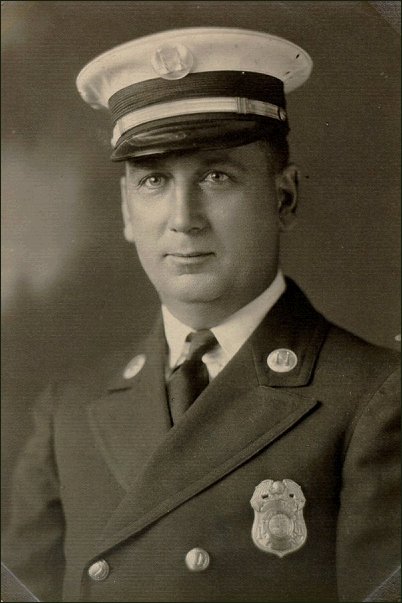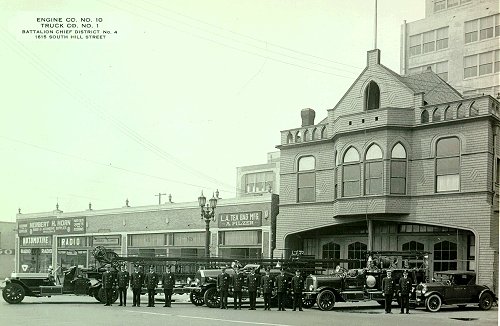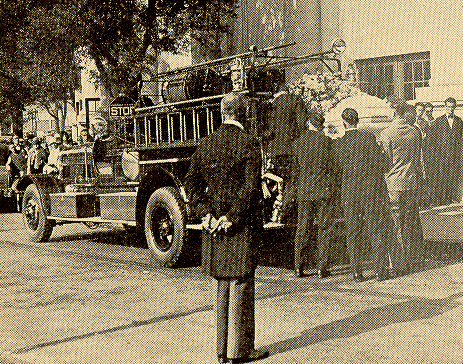|

|
At 4:44 p.m., Saturday, September 14, 1930, Engine 10 and Truck 11 were
dispatched from their 1615 South Hill Street station to the multi-story
Fiskin Building, a furniture wholesaler at 919 East Pico
Boulevard. Captain Elwood Henry of Engine Company 10 was serving
as acting district (battalion) chief and answered the rescue alarm.
Firemen found Daniel Gonzales, 5, one of the several
youngsters who had been playing in the elevator shaft, clinging to an
interior window ledge. The boy was critically injured when
squeezed between the elevator cage and the shaft. Truck 11 raised
a 50-foot Bangor ladder, brought the boy down and he was rushed to
Central Receiving Hospital. Henry was assured that all other
youngsters had fled the building and was preparing to leave when he was
told that another boy was trapped in the shaft. Henry went back
inside and, while looking up the shaft, slipped and fell head-first
15-feet to the concrete floor of the elevator pit. Henry, 42, died
at 9:10 that evening of skull fractures. The report that a second
youngster was in the shaft proved to be false. |
|
|
Those Heroic
Firemen
_____
Most wonderful fellows our firemen are, anyway!
Only two months ago Los Angeles noted the passing of
Theodore Craig, in a fall. He was perfecting himself in the business
of ladder climbing in order that he might some day, rescue human beings
trapped on a burning building.
It's no easy task to climb a five-story extension
ladder, but young Craig never faltered. He went at the job, only to
have his frail support give way and hurl him to the ground, dying--a
martyr to the duty which civilization demands of firemen.
Today the hero is E. B. Henry, assistant fire chief,
who gave his life for a little child. The youngster had been riding
up and down an automatic freight elevator, as he had seen older persons
do. When the car jammed at the third floor the lad climbed out and
slid down to the bottom of the pit on the cable.
Someone pushed the button on the first floor and the heavy
car descended, crushing the boy. When the fire department responded
to the call for assistance, Acting Chief Henry sought to release the
injured lad. He slipped and fell, his head striking the concrete
floor oft he pit, and a few hours later his life had gone out.
What wonderful fellows these firemen are! Ever
risking their lives in their hazardous calling, in order to save humans
and material property from destruction, they are deserving of all the
honor which we can give them. Let us remember that, too, when ever they ask
for adequate apparatus, and a fair wage. |
HONORS PAID
TO E. H. HENRY
------
With honors
befitting one who died in the performance of his duty, Acting Battalion
Chief E. H. Henry, killed while trying to rescue a child from an
elevator shaft, was buried yesterday afternoon in Inglewood Park
Cemetery.
Impressive services, attended by more than 200
firemen and policemen, were held in Angelus Temple.
Following these rites, the hero's body was borne to
its last resting place in a flower-banked fire truck--borne to the grave
by the apparatus, as he had requested.
Masonic services were performed at the cemetery by
the Moneta Masonic Lodge, of which the fire department officer was a
member.
Henry was fatally injured Sunday when he fell while
attempting to rescue 5-year-old David Gonzales, who had been crushed by
an elevator in a shaft at 935 South Olive street.
|
|
L. A. Evening Herald
|
|
|
|
CAPTAIN HENRY
PASSES ON
______
For
the third time within two weeks the Death Angel reached into our ranks and
called another one of our beloved members. Captain Elwood H. Henry
was born in Pennsylvania, July 18th, 1888, came to California in 1911,
became a member of the Los Angeles Fire Department August, 1912. He
was married shortly afterwards to Miss Jessie Morrow. To this union
was given two fine sons, Elwood, Jr. and Freddie. He lost his life
on Sunday, September 14th while on duty, rescuing a child trapped in an
elevator.
From the very time he came to work as a fireman he came
to take a great interest in the department. He advanced rapidly
always making a good showing in every promotional examination.
At the time of his death he was acting in the capacity of Battalion
Chief. For the past nine years he has been the Recording Secretary
of the Los Angeles Firemen's Relief Association. also Recording Secretary
of the Fire and Police Protective League from the time it was
organized. In every campaign that has been conducted for the welfare
of his fellow man, his time and energy was given for the promotion of the
things that were right. He always has a word of encouragement for
all; in fact, he lived the life of the poet, "Let me live in
the house by the side of the road and be a friend to man."
Funeral services were conducted by Alvarez & Moore under
the auspices of the Los Angeles Firemen's Relief Association at Angelus
Temple, September 18th, 1930, Chaplain John Y. Cordell officiating.
The floral expression of love and sympathy in the silent language of the
beautiful flowers can not be expressed in words. They came from far
and near, and of every kind. It was a most beautiful sight.
The Police Department turned out in large numbers
in uniform to show their respects to a comrade and friend that long will
be remembered in his untiring efforts, as the two departments labored
shoulder to shoulder in the interest of their brothers and the city which
they serve.
About five-hundred firemen in uniform and uniformed
police officers marched into the auditorium at 2:00 p.m., where a large
auditorium of sympathetic friends and relatives were waiting. As the
great Temple organ played softly, they were seated in a reserved section,
and the services began with Fireman Henry Grannis singing "Asleep in
Jesus."
Chaplain John Y. Cordell gave a very fitting eulogy as
to the beautiful character that he was and the life of devotion to duty
that he exemplified while in our midst.
Following the church services, the remains were carried
to the Inglewood Chapel in his hose wagon, No. 10, covered with beautiful flowers.
The Moneta Masonic Lodge, of which he was a prominent member, held the
last service, which was most impressive.
In addition to his wife and two sons, he leaves two brothers
and a sister to mourn their loss. We, the members of the Los Angeles
Fire Department, bring our tribute of love and bid a last farewell to our
comrade and friend, with the assurance of a happy reunion just inside the
Eastern Gate.
|
|
The Firemen's Grape
Vine, September 30, 1930 |
|

Engine Company No. 10 and Truck Company No. 1
1615 S. Hill Street
Circa 1925
|
|
By Bill Goss
A FRANTIC mother rushed into the old Fiskin
building at 919 East Pico street and with the aid of several small boys and her own
herculean efforts managed to span a heavy 2x10 plank across the half lowered freight
elevator gate to a small ledge on the opposite side of the shaft. Clambering out onto the
plank, she peered up into the heights of the shaft and there saw her young son, Daniel
Gonzales, aged 5, holding himself precariously in a blind window at the back of the
elevator well.
Little Gonzales had been playing in the elevator, riding up and
down, on this Sunday afternoon, September 14, 1930, as he and other boys had done many
times before, when the employees of the furniture company that used the building were
absent for the week-end. On this particular day the elevator had stopped opposite the
third floor and as other boys in the group attempted to restart the car, young Daniel
climbed up onto the top of the cage and was going to slide down the cables. As he was
about to go over the side of the car, it started upward. Frightened, he stepped onto the
only recess available, that afforded by the narrow confines of a blind window. The car
passed over his small body until it had to clear his head and this it jammed roughly back
into the opening as it scraped by. Although seriously injured Daniel Gonzales managed to
hang on to his perch and cry for help.
As the other boys in the group ran to the Gonzales home, which was to the rear
of the Fiskin building, Daniel's cries for help were heard by an employee of the furniture
company who happened to be working in a remote part of the building that day. After
quickly surveying the situation this employee put through a call to the fire department.
At 4:44 p.m., almost simultaneously the phones rang in the quarters of Engine 10
and at Truck 11, located with Engine 30. At 10s Captain Elwood Henry, Captain of Engine 10
on the B platoon, but acting chief of Battalion 4 on this fateful Sunday, answered the
phone and was given the address on East Pico which he gave to his operator, Ainsley D.
Cornwall, as the red buggy sped out of quarters.
Arriving at the location Captain Henry found the members of Truck 11 under the
command of Captain Harry A. Brown already at work trying to fee the injured boy from his
dangerous plight. First raising a 30-foot straight ladder in the shaft, they were unable
to reach the boy due to the 15-foot well of the shaft below the first floor. Returning to
the truck they next put a 50-foot Bangor up in the shaft and operator Ainsley Cornwall,
under Captain Henry's instructions, went aloft and brought the injured lad to safety. An
ambulance was summoned from the Georgia Street Receiving Hospital to where little Gonzales
was removed in a critical condition. Meanwhile Captain Henry went through the rest of the
building to see if there were any more injured or trapped boys on the upper floors.
Finding none he returned to the main floor and gave orders to the truck company to pick up
and go home. Taking one last look around the Captain went out of the building and as he
was about to get into his buggy a voice in the small knot of spectators, attracted by
sirens and shiny red apparatus, called out: "There is another boy trapped up in the
shaft."
|
|
Perhaps feeling that it wasn't so, Captain Henry nevertheless re-entered the
building and walked out on the plank still stretched across the gap and tilted his head to
look up into the tall building.
Outside Operator Cornwall and the members of Truck
11 were startled by a loud and reverberating crash. Rushing into the building Cornwall
found Captain Henry lying unconscious in the bottom of the shaft 15 feet below the main
floor. The jammed half open gate supporting one end of the plank on which Captain Henry
had been standing dropped free, causing the plank to slip off on one end and pitched him
down into the pit. The crash also brought the truckmen back to the scene and they quickly
put a ladder down to the bottom of the shaft and with an improvised stretcher brought the
heavy body of the injured officer to the ground level. Another ambulance summoned by
Operator Cornwall soon arrived and the still unconscious Captain was removed to the
receiving hospital.
At the hospital after a thorough diagnosis it was determined that Captain Henry
suffered a double basal skull fracture and that he had little or no chance for recovery.
Assistant Chief Edwards, commander of the B Platoon sent for Mrs. Henry and the Captain's
two sons. In their presence at 9:07 p.m. that same evening he passed away without ever
regaining consciousness.
Thus within the short period of three months the angel of death had reached out
and taken another member of the department, this time a most ardent and enthusiastic
worker. A man who was known throughout the Police Department and other organizations as
well as his own Fire Department. Captain Elwood Henry was Secretary of the Fireman's
Relief Association, Secretary of the Fire and Police Protective League, and a prominent
member of the Builders Club, a Masonic order of firemen. A man of great sincerity, he
devoted his boundless energy to the services of his fellow man rather than to the gain of
his own ends. He left a gap that has never been completely filled.
On Thursday afternoon, September 18, in the main auditorium of Angelus Temple,
floral offerings such as were seldom seen, brought their silent message of the respect and
love of the throng of friends and loved ones who mourned the loss of Captain Henry.
Shortly after one o'clock the crowd began to
assemble outside the Temple. Great loads of flowers arrived and soon the entire
platform and altar space of the Temple were completely filled with floral
blossoms. At the head of the gray casket where Captain Henry lay as though
sleeping, was a floral design of red roses in the shape of a fire box which bore
the inscription, "Box 5371" from which box he had received his last call to
duty. Surrounding the casket were flowers from the various divisions, battalions
and companies of the Fire Department as well as many blossom tributes from the
various Police Department groups and other friends who had known and respected
Captain Henry. On the casket lay his uniform cap which could never be worn
again, and upon the breast of the uniform which Captain Henry had so honored by
heroic service, there was pinned the badge of his department. It seemed to shine
a little more brightly than ever before, as though it were reflecting the last
rays of greatness from the staunch heart, now stilled, beneath it.
|
|
In attendance at the services were several hundred uniformed firemen and
policemen who came to personally pay their last tribute to their comrade and
fellow worker. The services were held under the auspices of the Firemen's
Relief Association with Chaplain John Y. Cordell officiating.
Several days before his death, in the quarters of Engine 10, Captain Henry had
said: "Boys, there is always a chance in our work that some of us may go West. Some
folks have their own ideas of the way they would like to pass on. As for me I don't want
much fuss. But there is just one thing I'd like to have if I ever pass on in this game,
and that is that you'll let me have my last ride on a truck."
And so true to Captain Henry's last wishes, following the church services, the
remains were carried to Inglewood Cemetery in his own wagon from Engine 10. The Moneta
Masonic lodge of which he was a prominent member, held the last services at the cemetery.
Captain Henry was born of Scotch-Irish parents in Red Lion, Pennsylvania on July
12, 1888. He was appointed to the Los Angeles Fire Department on July 6, 1912, was made a
regular Lieutenant on April 5, 1922, and a regular Captain on January 17, 1924. He started
his fire department career on the Fire Prevention Bureau, then in its infancy, and
finished the balance of his eighteen years service at Engines 5B, 19B, 24A and 10B.
He left behind his widow, Mrs. Jessie Henry, who passed away August
20, 1936, and two sons Elwood, Jr., and Fred. Elwood, Jr., now 31, is a member of the U.S.
Coast Guard and when last heard from was serving in Northern Pacific waters. Fred, now 19,
and whose guardian is Tom Carmichael, is also a member of the Coast Guard and a gun
captain on a freighter operating out of Calcutta, India.

Respecting his wishes, the remains of Captain Henry
are being placed on Engine 10 for the "last run."
|